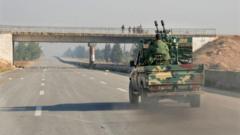The Syrian War Reignites: A New Chapter of Conflict
The ongoing conflict in Syria has recently escalated, marking a significant shift in the region’s dynamics following the Hamas attacks on Israel in October 2023. The war, which many thought had subsided, has suddenly reignited with a surprising rebel offensive that challenges President Bashar al-Assad’s regime.
During the past decade, Assad survived by ruthlessly suppressing opposition, relying on powerful allies like Russia, Iran, and Hezbollah. However, these allies are now significantly weakened. Iran is reeling from Israeli attacks, Hezbollah has been crippled, and Russia is primarily focused on its war in Ukraine.
A coalition of rebel groups, led by Hayat Tahrir al-Sham (HTS), has launched a remarkable offensive from the Idlib province. In just a few days, they have swept away Syrian government troops and captured strategic locations, including parts of Aleppo, a city previously considered an impregnable government stronghold.
HTS, which has roots in al-Qaeda but has attempted to rebrand itself, is still designated as a terrorist organization by multiple international bodies. Its leader, Abu Mohammad al-Jawlani, has strategically moved away from strict jihadist rhetoric to broaden the group’s appeal. The offensive, branded as “Operation Repelling the Aggression,” uses neutral language to distance itself from its extremist past.
The current landscape of northern Syria is complex. The region is fragmented, with different areas controlled by various groups: Kurdish-led Syrian Democratic Forces in the northeast, Turkish troops and sponsored militias in border regions, and various rebel factions.
Reports indicate that rebel forces have captured significant military equipment, including helicopters, and are advancing towards Hama, potentially threatening Damascus. The Assad regime and its allies are expected to counterattack, likely using air power, while the rebels lack an air force.
The UN envoy to Syria, Geir Pedersen, has expressed serious concern about the developments, warning of severe risks to civilians and potential regional instability. He emphasized that the conflict cannot be resolved through military means and highlighted the collective failure to implement a genuine political process.
The original UN peace plan, Resolution 2254, envisioned free elections and a new constitution, effectively requiring Assad to relinquish power. However, the regime’s brutal history—with over half a million deaths during the conflict—demonstrates its unwillingness to do so.
While it may be premature to declare the Assad regime’s defeat, the current offensive reveals its continued vulnerability. Some Syrians still view the regime as a preferable alternative to the jihadist elements that dominated the rebellion, but the emergence of new anti-Assad groups could once again threaten its survival.
The renewed conflict underscores the ongoing complexity and volatility of Syria’s political landscape, with no clear resolution in sight.




